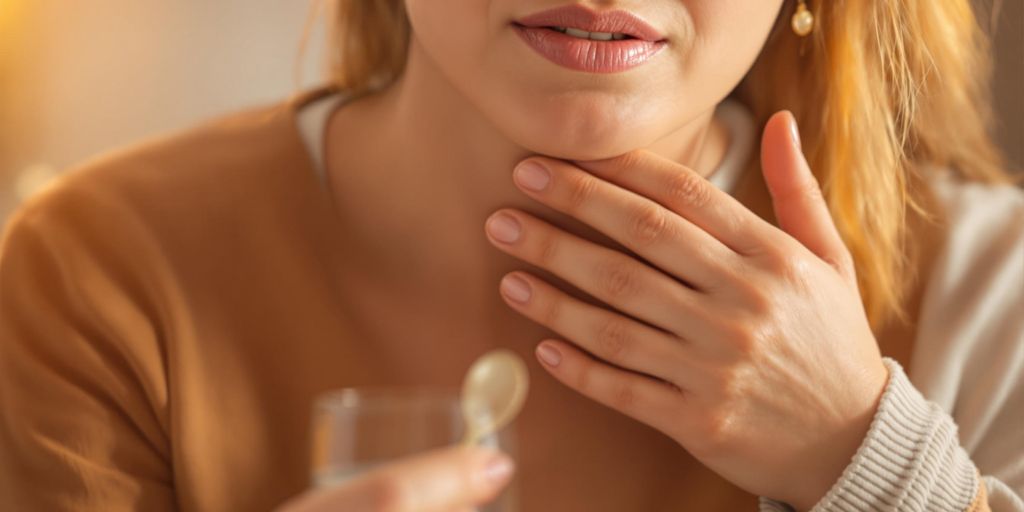Discover effective techniques on how to stop hiccups instantly with breathing, pressure, and food remedies.
Hiccups can be super annoying, right? They pop up out of nowhere and just refuse to go away. Whether you’re in the middle of a meeting or just trying to relax, those little diaphragm spasms can be a real pain. So, what’s the deal with stopping them? Well, there are actually quite a few tricks you can try. From breathing techniques to munching on a lemon slice, there’s something for everyone. Let’s dive into some effective ways to kick those hiccups to the curb.
Key Takeaways
- Breathing exercises, like deep breaths or holding your breath, can help stop hiccups quickly.
- Applying pressure to certain areas, like the bridge of your nose, can relax your diaphragm.
- Sipping cold water or eating sugar might stimulate nerves to stop hiccups.
- Physical maneuvers, such as hugging your knees, can also be effective.
- If hiccups last more than 48 hours, it’s time to see a doctor.
How to Stop Hiccups – Breathing Techniques to Stop Hiccups

Deep Breathing Exercises
When hiccups strike, one of the first things you might want to try is altering your breathing pattern. Deep breathing exercises can help calm the diaphragm and stop those annoying spasms. Try this: Breathe in slowly, counting to five, then exhale just as slowly, also counting to five. Repeat this a few times, and you might just find your hiccups disappearing.
Holding Your Breath
Another classic trick is holding your breath. Take a big gulp of air and hold it for about 10 to 20 seconds. This method increases the carbon dioxide in your blood, which might help to reset the diaphragm and stop the hiccups. If you’re feeling adventurous, you can even try to hold your breath and swallow three times for an added challenge!
Breathing Into a Paper Bag
Breathing into a paper bag is another technique that might help. It works by increasing the carbon dioxide in your bloodstream, which can sometimes relax the diaphragm. Just make sure not to overdo it—breathe in and out of the bag slowly and stop if you start feeling lightheaded. Remember, moderation is key when trying this method.
Sometimes, all it takes is a few simple breathing tricks to get your diaphragm back on track. With a little patience and practice, you might find one of these methods to be your go-to solution for hiccups.
Applying Pressure to Key Points
Hiccups can be a real nuisance, right? Well, there’s a neat trick to help you out—applying pressure to certain spots on your body. These spots can send signals to your body to relax that jumpy diaphragm of yours.
Squeeze the Bridge of Your Nose
One simple yet effective technique is to squeeze the bridge of your nose. It might sound odd, but this little action can actually help calm your diaphragm. Just gently pinch the bridge of your nose for a few seconds.
Massage Your Carotid Artery
Another method involves your carotid artery, which is located on the sides of your neck. Lie down comfortably, turn your head to the left, and with your right hand, massage the artery on the right side in a circular motion for about 5 to 10 seconds. This can help soothe the spasms causing the hiccups.
Press on Your Diaphragm
Finally, you can try pressing on your diaphragm. This is the muscle that’s doing all the hiccupping. Just place your hand right below your ribcage and apply gentle pressure. This might help settle things down.
Applying pressure to these key points isn’t just about stopping hiccups; it’s about giving your body a little nudge to get back to its normal rhythm. Sometimes, a gentle touch is all it takes to make a big difference.
Food and Drink Remedies for Hiccups
Finding yourself in the middle of a hiccup fit can be frustrating, but there are some simple food and drink remedies that might help you out. These methods are easy to try and often surprisingly effective.
Sip Ice-Cold Water
One of the easiest tricks is to sip on ice-cold water. The sudden chill can help reset the diaphragm, which might be just what you need to stop those hiccups. Slowly sipping cold water can stimulate the vagus nerve, which plays a role in controlling hiccups. Try taking small sips every few seconds until the hiccups fade away.
Suck on a Lemon Slice
If you’re up for a bit of tanginess, sucking on a lemon slice could be your answer. The sourness can jolt your senses and stimulate the vagus nerve, potentially stopping the hiccups. Some people find it helpful to dip the lemon slice in a bit of sugar before sucking on it—this can make the experience a bit more pleasant.
Eat a Spoonful of Sugar
A classic remedy involves a spoonful of sugar. Letting the sugar sit on your tongue for a few seconds before swallowing might help interrupt the hiccup reflex. This method is thought to work by stimulating the vagus nerve and altering the nerve impulses that are causing the diaphragm to spasm.
Sometimes, the simplest kitchen ingredients can become your best allies in the battle against hiccups. Whether it’s the chill of ice water or the tang of a lemon, these remedies are worth a try when hiccups strike unexpectedly.
Physical Maneuvers to Halt Hiccups

Hug Your Knees
When hiccups hit, one surprising way to tackle them is by hugging your knees. Lie on your back, pull your knees towards your chest, and hold them tightly. This position puts pressure on the diaphragm, which might just stop those pesky spasms. It’s a simple trick that can make a big difference.
Perform the Valsalva Maneuver
The Valsalva maneuver is another technique you can try. Take a deep breath, close your mouth, and pinch your nose shut. Then, try to exhale forcefully. This action creates pressure in your chest, which can help reset the diaphragm and stop hiccups in their tracks.
Pull Your Tongue
A peculiar yet effective method involves gently pulling your tongue. With clean hands, grab the tip of your tongue and give it a gentle tug. This action stimulates the vagus nerve, which can help interrupt the hiccup reflex. It’s odd but worth a shot when nothing else seems to work.
Sometimes, the simplest methods are the most effective. These physical maneuvers might seem quirky, but they can be just what you need to get rid of hiccups fast.
If you’re looking for more ways to tackle hiccups, check out these simple physical maneuvers that might help alleviate them.
Stimulating the Vagus Nerve
Hiccups can be annoying, but they can sometimes be stopped by stimulating the vagus nerve. This nerve plays a crucial role in controlling the diaphragm, and by influencing it, you might be able to stop those pesky spasms.
Gently Press on Your Eyeballs
One unusual but effective method is to gently press on your eyeballs. Close your eyes and use your fingertips to apply light pressure for a few seconds. This method is thought to send signals through the vagus nerve, helping to calm the diaphragm. Be careful not to press too hard, as the eyes are sensitive.
Plug Your Ears and Swallow
Another way to stimulate the vagus nerve is by plugging your ears. Using your fingers, gently press on the indentations just behind your earlobes. While doing this, try to swallow a sip of water. This can create a change in pressure that may help stop the hiccups. Drinking a glass of water can also help stimulate the vagus nerve, which regulates communication between the brain and stomach.
Use the Valsalva Maneuver
The Valsalva maneuver is a technique that involves taking a deep breath and trying to exhale while keeping your mouth and nose closed. This action increases pressure in the chest cavity, which can stimulate the vagus nerve. It’s a simple trick that might just do the job. Just remember not to do it too forcefully to avoid discomfort.
If you’ve ever tried these methods and found relief, you know how satisfying it can be to finally stop those hiccups. It’s like a small victory over your own body.
When to Seek Medical Attention for Hiccups
Persistent Hiccups Lasting Over 48 Hours
Hiccups are usually a minor annoyance that go away on their own. But if they stick around for more than 48 hours, it might be time to think about seeing a doctor. Persistent hiccups could be a sign of something more serious going on inside. Conditions like acid reflux, stroke, or even multiple sclerosis have been linked to long-lasting hiccups. It’s not something to panic about, but definitely worth checking out.
Hiccups Accompanied by Other Symptoms
Sometimes, hiccups don’t come alone. If you start noticing other symptoms like trouble swallowing, chest pain, or shortness of breath tagging along with your hiccups, it’s a good idea to consult a healthcare provider. These could point to underlying issues that need attention.
Medications for Chronic Hiccups
When hiccups just won’t quit, and other methods have failed, medication might be the next step. Doctors can prescribe meds to help calm the diaphragm spasms causing the hiccups. These aren’t typically the first line of defense but can be effective in stubborn cases.
Hiccups are generally harmless, but when they overstay their welcome, it’s your body’s way of telling you to pay closer attention. Don’t ignore persistent hiccups—they could be a clue to something more serious.
Preventing Hiccups from Recurring
Avoid Carbonated Drinks
Carbonated drinks are a common trigger for hiccups. The bubbles in these drinks can cause your stomach to expand, putting pressure on your diaphragm and leading to hiccups. It’s a good idea to limit or avoid these drinks if you’re prone to hiccups. Opt for still water or herbal teas instead.
Eat Smaller, More Frequent Meals
Eating large meals can stretch your stomach and irritate the diaphragm, which might trigger hiccups. To prevent this, try eating smaller meals more frequently throughout the day. This not only helps with hiccups but can also aid digestion and keep your energy levels steady.
Manage Stress and Anxiety
Stress and anxiety can also contribute to hiccup episodes. Finding ways to manage stress can be beneficial. Consider activities like yoga, meditation, or even just taking a walk to clear your mind. Keeping stress in check not only helps prevent hiccups but also improves overall well-being.
Hiccups might seem trivial, but they can be a real nuisance, especially when they keep coming back. By making a few simple changes to your daily habits, you can reduce the chances of those pesky hiccups returning.
Wrapping It Up: Quick Fixes for Hiccups
So there you have it, a bunch of ways to tackle those pesky hiccups. Whether you’re holding your breath, sipping cold water, or trying out the good old sugar trick, there’s something for everyone. It’s all about finding what works for you. And hey, if one method doesn’t do the trick, don’t sweat it—just move on to the next. Hiccups are usually harmless and go away on their own, but it’s always nice to have a few tricks up your sleeve. Next time they strike, you’ll be ready to send them packing in no time.
Watch video below:
Frequently Asked Questions
What are hiccups and why do they happen?
Hiccups are sudden, involuntary contractions of the diaphragm muscle. They usually occur due to eating too quickly, drinking carbonated beverages, or sudden excitement.
How can I stop hiccups using breathing techniques?
You can stop hiccups by holding your breath, taking slow deep breaths, or breathing into a paper bag. These methods help calm the diaphragm.
Are there foods or drinks that help stop hiccups?
Yes, sipping cold water, eating a spoonful of sugar, or sucking on a lemon slice can help stop hiccups by stimulating the nerves connected to the diaphragm.
When should I see a doctor about hiccups?
If hiccups last more than 48 hours or are accompanied by other symptoms, it’s important to seek medical advice as it may indicate an underlying condition.
Can stress cause hiccups?
Yes, stress or sudden excitement can trigger hiccups as they may cause the diaphragm to spasm.
How can I prevent hiccups from happening again?
To prevent hiccups, avoid eating too quickly, steer clear of carbonated drinks, and manage stress through relaxation techniques.




